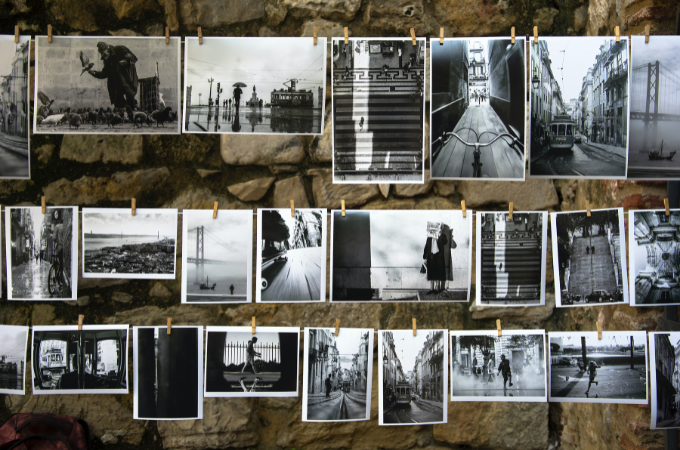
Feyisetan had a penchant for keeping things she no longer needed. Her mother called it hoarding; she herself deemed it an artform. Empty, glossy bottles of perfume whose reminiscent breath teleported her to a fading time, voice messages from cobwebbed group chats that induced in her a numbing nostalgia, incomplete to-do lists creased by months and blotted by ketchup or tears in all the perfect places.
When you walked into Feyi’s room, the first thing you noticed was the explosive splash of pictures, a collage stretching across all four walls. Just above the bedside lamp, you could see 11-year-old her on Landmark Beach, embracing Dara, her oldest childhood friend who… was no longer really her friend at all. They had lost touch once they were out of sight. If you looked near the vanity mirror, you would catch Feyi beaming outside of Terra Kulture, where she had just watched a Wole Soyinka play. The picture wouldn’t tell you that her cheek was not red from blush, or even from the searing Nigerian sun, but from a slap – a swift, acidic slap – warranted by what her mother had called ‘a lack of presence of mind’. She had been seething inside, but her dress had been pretty, and so she mustered a matching smile, just for the camera. She could choose what got to be captured by the click from that day.
In the corner of the room stood a bookshelf that housed everything but books – from rusted, too-small rings to scratched but shiny Sesame Street DVDs, from loose bits of paper animated by indecipherable primary school doodles to fluffy pink pens that had long since run out of ink. There were jars and jars of cavitied baby teeth and sticky Ring Pop wrappers, of memories and mistakes. She liked that she could freeze life in time, grind it into little, digestible pieces for whenever she needed. That she could catch every drop, immortalize every single moment, every experience.
Now surrounded by all this she sat, for the first time unable to find solace in any of it. It had been just under two hours since her mother gave her the news: yesterday morning, Grandpa did not wake up. She had said it while licking a wooden spoon to taste if the palm oil of her vegetable soup needed more pepper, more Maggi. She had said it as if she was telling the time. The news did not hit Feyisetan all at once. It was more of a slow, painful perforation of her consciousness.
“Your grandpa had been sick for a very long time. Constant clouds over his head. A shadow of who he once was,” her mother turned the pot’s contents more quickly, splashing the hot, red oil. “We were all praying for healing, for freedom from the pain, maybe God taking him back was the answer to that.”
Feyi tried to think about the last time she saw her grandpa, think about why she had not noticed that he had been kneaded flat by the rolling pins of debilitating illness.
“So,” her mother sniffled, from the pepper’s steam or the loss’s sting, Feyi did not know, “if I seem calm, it is because I have already mourned. My father did not die yesterday, but many, many months ago.”
Feyi’s mind started spooling out to the last photos she and the old man had taken together, the last Christmas gifts he had given, last kisses he had planted. In her head, she started to reconstruct him just small enough to fit on a shelf, perhaps even in a box.
“I know it’s early to say, but as his oldest grandchild, I’m sure you understand that you will be giving one of the eulogies at his funeral.” The soup bubbled and spat. “You were very special to him.”
Feyisetan nodded a million fervent nods. “I will start working on it right away.”
But now, sitting in her room, she struggled to write beyond the first sentence: My grandpa was a mathematics professor, a practical man. She had spent the last couple of hours shaking jars, smelling bottles, scanning rows, and peeling walls – searching for anything, anything, that she could use to write something personal, something not just anyone who had met Grandpa could say. As she foraged her rich reserve of memories, what started off as a slow and meticulous quest morphed into a frantic, futile one. Not in the unsettled dust of her ‘Handwritten Letters’ drawer, nor in the forgotten cracks of her ‘Something Borrowed’ wardrobe could Feyisetan find a single vestige of her grandfather. He was already disappearing.
Then it struck her. The photo album. Embossed and heavy, made in celebration of Grandpa’s 80th birthday just last year. Flipping through it in a panic, with an urgent, desperate desire, Feyi found that she was left with more questions than answers. The album did not tell her anything she did not already know.
She already knew that Grandpa’s smile had been dimpled, endearingly lopsided, but it was a mystery to her what was behind that smile, what had brought him the greatest joys. She was well aware of his slight hunchback, but wondered what burdens, what fears and unspoken sacrifices he had carried on it. As she turned the pages, his face grew harder and his eyes darker, and Feyi wished, with a growing hole in her stomach, that she had paid more attention. She did not know this man. And now she never could. They had had a lot of pictures, she and Grandpa, but not nearly enough conversations.
Feyi had always thought about memories as the crumbs of life, small and precious, that we could pick up, salvage; leftovers to treat ourselves with after a moment had passed. Memories were the things we could show off on Instagram or pin up on a wall. But as she holds in her hand the heavy shell of her grandfather, she yearns not for the crumbs, but the mouth that ate the loaf. Not to remember the essence of a time passed, but to have been present in it.
Photo by Brigitta Schneiter on Unsplash









TeeSal May 07, 2022 19:34
This is such a compelling read. Been back twice to soak it in. This is one writer to watch out for.